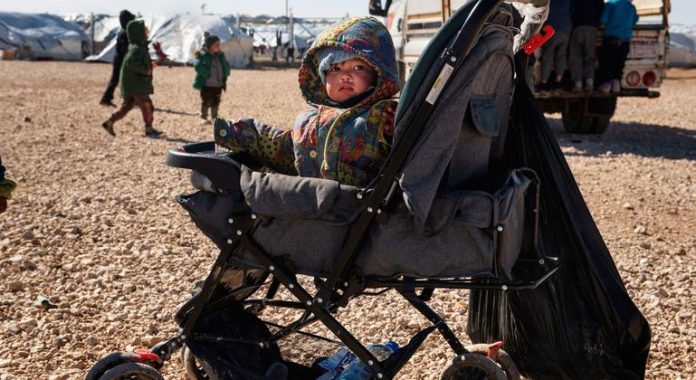This urgent humanitarian and security situation threatens stability in the region and beyond, but the political transition underway in Syria could provide an opportunity to step up repatriations.
The issue was the subject of a high-level international conference organized by the Government of Iraq with technical support from the UN Office of Counter-Terrorism (UNOCT), held on the sidelines of the General Assembly debate on Friday.
Mainly women and children
Currently, more than 30,000 people, including suspected foreign terrorist fighters and their family members, are being held at the notorious Al-Hol camp and other surrounding sites.
Most are women and it is estimated that 60 per cent of the overall population in these facilities is under 18, and mainly under the age of 12.
Foreign nationals number some 8,500 people from over 62 countries.

UN Secretary-General António Guterres (2nd right) met returnees from Syria at the Jeddah Rehabilitation Centre, Iraq, in March 2023.
Iraq leads the way
At its height, ISIL controlled large areas across Syria and Iraq, committing widespread atrocities including mass executions, rape and forced recruitment, in its drive to establish an Islamist caliphate.
Many of the detainees are from these two countries, and Iraq has taken a leading role in repatriating its nationals, with more than 17,000 returned through an integrated security, legal and humanitarian operation.
“Our aim is to re-integrate them into their communities and their places of origin,” said President Abdul Latif Rashid.
“We cooperate with international organizations to achieve this objective. Our aim is to ensure them a safe future and a dignified life in their country.”
Potential ‘incubators of radicalization’
Back in Syria, conditions in the camps “are dire and very alarming”, said UN Acting Under-Secretary-General for Counter-Terrorism, Alexandre Zouev.
Residents not only “face prolonged detention without legal basis and without due process”, but “women and girls have experienced or are at risk of sexual violence” while children lack bare essentials and access to formal education.
“With Daesh attacks and assorted humanitarian actors limiting services, the camps threaten to turn into incubators of terrorist radicalization and future recruitment,” he warned.
‘Window’ for action
The UN believes that the fall of the Assad regime in Syria last December and other developments in the country have provided “a window for decisive action” on the issue.
‘Whilst the situation in northeast Syria grows more complex with increasing volatility, Daesh attacks and limited humanitarian access, Member States have new avenues now to engage directly with different stakeholders and to advance solutions,” said Guy Ryder, Under-Secretary-General for Policy.
“But that window can quickly narrow, and inaction would carry serious consequences for regional stability and for international peace and security.”
Issue of Syrian returnees
Mr. Ryder spoke on behalf of the Secretary-General whose Special Envoy for Syria, Geir Pedersen, also highlighted an agreement signed in March between the new authorities in Damascus and the Kurdish-led Syrian Democratic Forces (SDF), the de facto authorities in the northeast.
It “emphasized the need for full integration of all civil and military institutions in northeastern Syria into the administration of the Syrian State” and calls for ensuring “the return of all displaced Syrians to their towns and villages and securing the protection by the Syrian State.”
Repatriation just ‘the first step’
The UN officials underlined the Organization’s commitment to supporting countries in their repatriation efforts, calling for renewed urgency and momentum.
Iraq has also offered to share its expertise, with President Rashid urging the international community to “turn the page on this inhumane chapter” and empty the camps by the end of the year.
However, as Mr. Zouev pointed out, “repatriation is only the first step on the long journey to break the cycle of violence”.
He explained that it “must be complemented by accountability as well as rehabilitation and reintegration support tailored to the diverse needs of different returnees”, and fostering trust in communities receiving them.
“In this regard, it is absolutely crucial not to lose sight of the imperative of justice for victims and survivors of terrorism,” he added.




